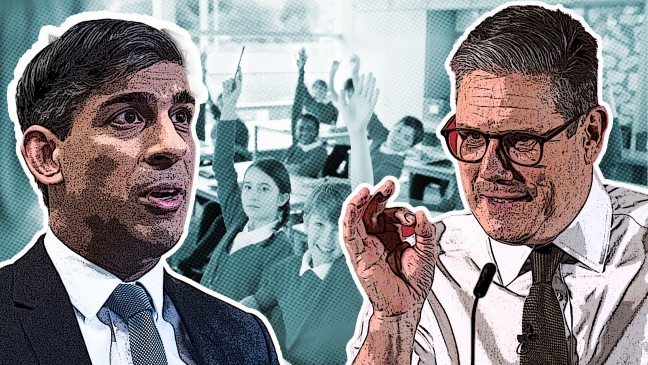The last time a Labour opposition went into an election with a big poll lead - in 1997 - education was the single most important issue for voters. Indeed, it is the only time in the 50 years that the pollster Ipsos has been asking voters about the most important issues that education has come top.
Back then the general consensus in the media was that too many comprehensive schools were failing and inner cities were full of sink schools that parents avoided if they could afford to. The first waves of Ofsted reports and national tests had revealed major weaknesses in academic standards.
Tony Blair took full advantage, repeatedly citing education as his biggest priority and putting a pledge to reduce class sizes at the centre of his election campaign. In government he gave schools the biggest injection of cash they’ve ever had.
Education isn’t an election priority
Almost 30 years on and, partly because of that, things look very different. Education is now eighth on that Ipsos voter priorities list - way behind the NHS, economy and immigration.
There is far less press criticism of schools, which are seen as one of the more well-functioning bits of a creaking state. Education will play a far smaller role in this election than it did in 1997.
The Conservatives are focusing on a core-vote strategy, so will be talking about tax cuts, defence (thus the bizarre national service pledge announced without, apparently, any thought or preparatory work) and small-boat migrants.
More from Sam Freedman:
They have gone rather quiet on Rishi Sunak’s big conference pledge to introduce new post-16 qualifications, which, unsurprisingly, turned out not to be a big priority for the public, though it will undoubtedly feature in the manifesto.
Labour will talk about education more. Sir Keir Starmer’s six “first steps” pledges include one to recruit 6,500 more teachers in areas where there are shortages. It’s not entirely clear how the party intends to recruit more teachers or whether this is an annual commitment or a one-off. But at least it’s an acknowledgement of one of the serious challenges that schools face.
Beyond that, don’t expect much. Labour’s strategy is to assuage the fears of floating voters who felt unable to support them in 2019. Their slogan might be “change” but it’s a very risk-averse version, emphasising security and stability.
Labour does have some smaller policies targeted more at the sector rather than the general public. which are a mix of sensible (breakfast clubs), vague (a curriculum review) and more complicated than it seems to realise.
Removing single-word judgments from Ofsted reports falls into this latter category. The policy is understandably popular with headteachers, but it opens up a whole string of difficult questions about how, and on what basis, it will regulate schools and hold them accountable.
I suspect leaders may find that they prefer the clarity of Ofsted judgments, as brutal as these can be, to arbitrary decisions by civil servants about what “good” looks like.
As with so many policy areas, Labour’s caution is primarily a result of its refusal to (publicly) contemplate higher taxes or borrowing. Which means that it can’t promise anything that will cost much money.
So there will be nothing on teacher pay, the large hole in special educational needs and disabilities (SEND) finances or restoring 16-19 funding, which has been cut far more than anything else. If Labour does find any spare cash, a pledge on fixing crumbling school buildings would go down well with voters, but I don’t hold out huge hope for this either.
Private school finances
If any education issue makes it to the front pages during this election, it will probably be (yet again) Labour’s plan to impose VAT on private school fees. This coverage will largely be due to the financial interests of a number of newspaper editors and their friends.
We will go round all of the same specious arguments that have been debunked before (no, the state sector will not be overwhelmed by fleeing private school kids).
Labour is absolutely committed to it, though, and the policy has significant public support.
Indeed, the more wealthy people whine about the inconvenience, in a country where 150,000 children are living in temporary accommodation and millions more in poverty, the more popular it gets.
Schools in need of support
We can only hope that education gets bumped up the priority list once Labour are in government.
The fear is that the party will be faced with so many crises across the public sector that schools and colleges will feel like the spinning plate that can be most easily ignored for now. At least when it comes to setting budgets.
As anyone working in a school knows, we’re not all that far away from that plate crashing to the floor, given issues not just with teacher recruitment but with the widespread setting of deficit budgets, rising demand for SEND and mental health support, and deepening child poverty.
Schools have done an incredible job in maintaining academic results through all the challenges of the past few years. At some point, they’re going to need a government to help them out.
Sam Freedman is a senior fellow at the Institute for Government and a former senior policy adviser at the Department for Education
For the latest education news and analysis delivered directly to your inbox every weekday morning, sign up to the Tes Daily newsletter





